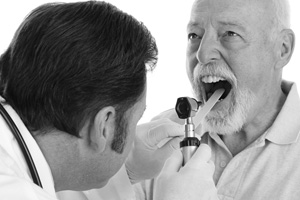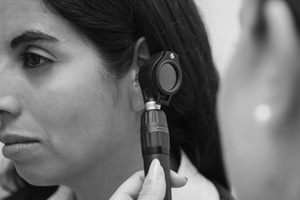View the complete list of conditions
Can Snoring Cause Health Issues?
Snoring happens when something interferes with or restricts your airflow during sleep. These restrictions cause soft tissue in the mouth, throat and nose to vibrate and make sounds. In addition to disrupting your and others’ sleep, loud and long-term snoring can increase the risk of serious health problems. However, there are strategies and procedures to stop or minimize snoring. It’s important to talk about these treatments (both surgical and non-surgical) with your doctor.
Most people snore at one time or another, including children. Several risk factors make snoring more likely, including:
- Weight – Excess body fat adds pressure and compresses airways
- Age – Muscle tone decreases with age and may cause airways to constrict
- Substances – Alcohol and medications that relax muscles can restrict airflow
- Gender – Men are more likely to snore
- Family History – Snoring runs in families
- Anatomy – Enlarged adenoids or tonsils, deviated septum, muscle weakness or a longer soft palate and tongue can all restrict airways
- Illness and Allergies – Colds and allergies can cause nasal swelling and breathing through the mouth
- Pregnancy – Hormonal changes and weight gain cause breathing passages to swell
Snoring and Heart Issues – The Effects of Snoring on Health
Long-term snoring can increase the risk of heart attack and stroke. Snoring is classified into three main types: light (occasional or mild), primary (more than three nights a week) and snoring related to obstructive sleep apnea (OSA). OSA is a dangerous condition in which breathing stops briefly, and the brain signals the body to wake up throughout the night. A sleeping person may gasp suddenly for breath or awaken with a jerk. Other health risks associated with long-term snoring and OSA are:
- Diabetes (type II)
- Focus and attention problems
- Behavior problems in children
- Tiredness during the day
- Heart attack
- Strok
- High blood pressure
- Low blood/oxygen levels
- Morning headaches
An Ear, Nose and Throat (ENT) Doctor for Snoring
Dr. Cohen provides both surgical and non-surgical treatment options for patients who snore. All treatments are designed to help open your airways while you sleep. ENT specialist physicians concentrate on the structures and treatment of the head and neck. They can spot issues and are familiar with the latest snoring treatment options, including:
Non-Surgical Treatments for Snoring:
- Mouth Device – A special oral appliance (not a sports mouthguard) can keep the jaw in the proper position during sleep to reduce snoring.
- CPAP, BIPAP, APAP Machines – Continuous positive airway pressure devices can keep airways open with gentle airway pressure.
- Nasal Strips – Over-the-counter flexible adhesive sticks applied to the outside of the nose before bed are designed to open the nasal passages.
- Mouth Exercises – Specific exercises have been designed to strengthen the muscles around the airway.
- Medication – Medicines to relieve nasal congestion can reduce mouth-breathing and snoring.
- Lifestyle – Adjusting sleeping positions, losing weight and avoiding alcohol and sedatives before sleeping can help reduce snoring.
- Positioning – Raising the head of your bed a few inches, using a special snore-reducing pillow to change the position of your head and neck, or sleeping on your side rather than your back can help reduce snoring.
Surgical Treatments for Snoring:
- Removing Tonsils and Adenoids – Excess tissue is removed from the back of the throat and back of the nose in the tonsillectomy and adenoidectomy procedures.
- Repairing a Deviated Septum – Straightening and reshaping a deviated septum (septoplasty) can improve nasal airflow.
- Reshaping Uvula – A uvulopalatoplasty removes tissue in the soft palate to help improve airflow. The Pillar procedure uses implants to stiffen and reshape the uvula.
- Ablation – This technique shrinks tissue in the throat.
- Nasal Polyp Surgery – Removing polyps that obstruct the nose can open nasal passages and help eliminate mouth breathing.
A Snoring and Sinus Specialist in NYC
Snoring is not merely annoying but can signal a bigger health problem. Occasional snoring during a cold or other illness is normal. But if snoring lasts more than a few nights or is very loud, patients should be evaluated for treatment and checked for related health conditions. The sinuses, ears and throat are all connected internally, so it is important to seek help for snoring from an ENT specialist physician who tis an expert in these structures. To help you get relief from snoring, contact our Manhattan Upper West Side office to schedule an appointment.
Conditions
Ears
Nose
- Ballon Sinusplasty Surgery
- Concha
- Deviated Septum Relief In NYC
- Deviated Septums
- Fixing a Deviated Septum
- Identifying A Deviated Septum
- How Do I Know if My Nose is Broken?
- Nasal Polyps
- Nasal Polyp Surgery
- Nasal Septums
- NYC Nasal Polyp Reduction
- Septoplasty And Turbinate Surgery
- Treating a Deviated Septum
- Treating Nasal Polyps
- Turbinate Reduction
Throat
- Dysphagia
- Leukoplakia Treatments
- Reflux Laryngitis
- Swallowing Disorders
- Treating Anosmia
- Vocal Disorders
Allergies & Asthma
- Dealing With Allergic Rhinitis
- Managing Allergies and Asthma
- How to Allergy-Proof Your Home from Indoor Allergens
Sinus
- Chronic Sinusitis Treatment
- Endoscopic Sinus Surgeries
- Sinus Headache Cure
- Sinus Infection Treatment
- Sinusitis Surgery
- Treating Sinus Infections
Sleep & Snoring
- Diagnosing Sleep Disorders
- Having Trouble Sleeping
- Home Sleep Studies
- Pillar Implants
- Pillar Treatment for Snoring
- Sleep Apnea Conditions
- Sleep Apnea Specialists
- Sleepless in NYC
- Sleep Study Diagnosis
- Can Snoring Cause Health Issues?
- Treating Sleep Apnea
- Treating Snoring
- What is a CPAP Device?





